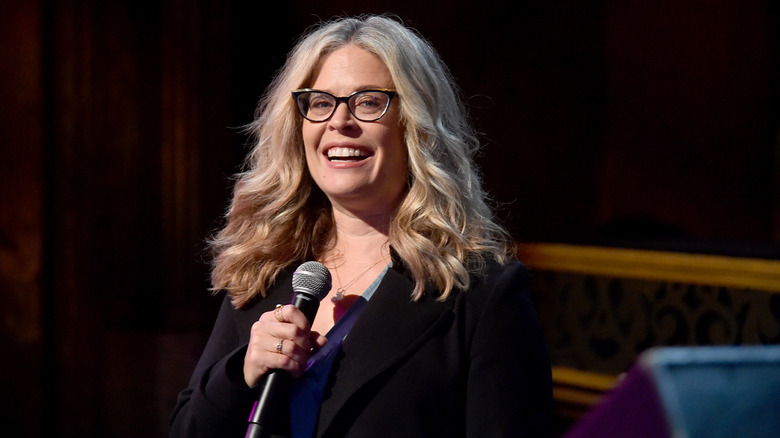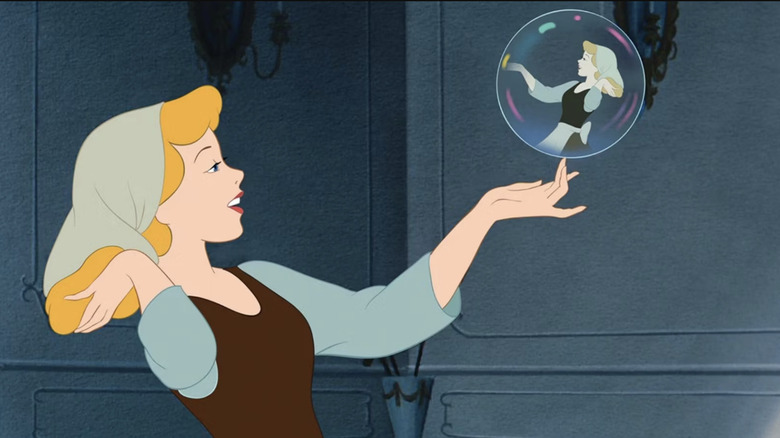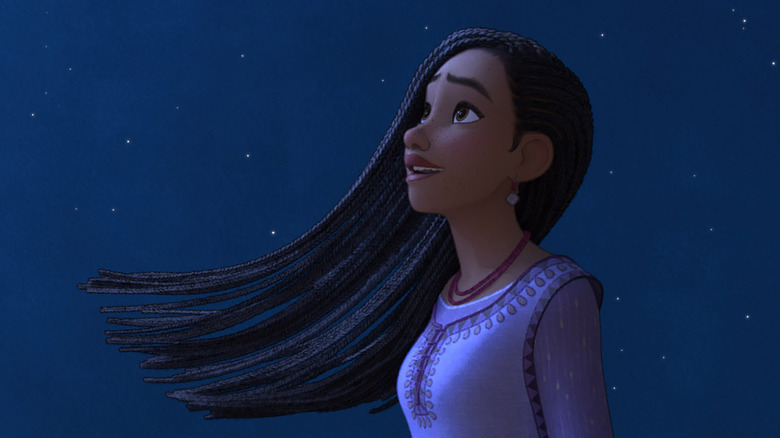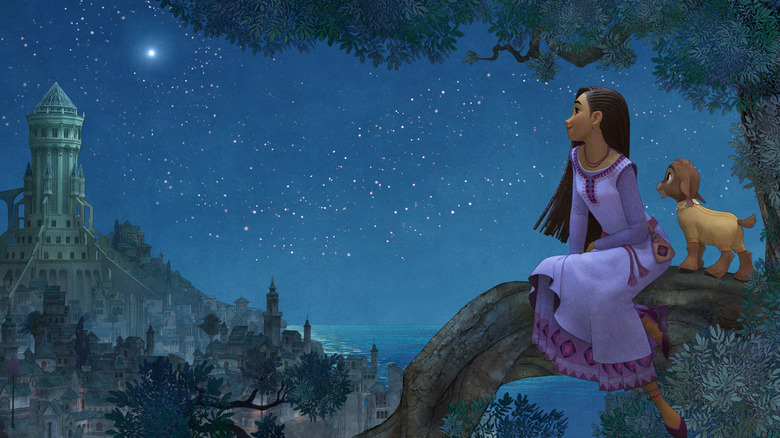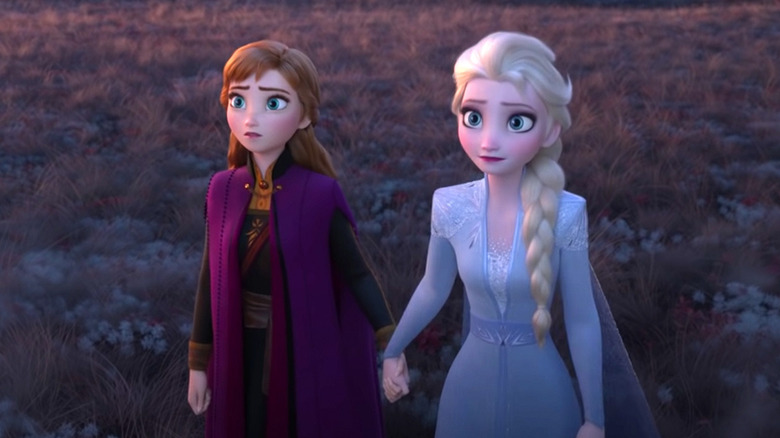Walt Disney Animation Head Jennifer Lee On Wish And Maintaining The Magic For Adults [Exclusive Interview]
Not to girlboss too close to the sun or anything, but there are few women in the entertainment industry as inspiring as Jennifer Lee. The current chief creative officer of Walt Disney Animation Studios first joined the House of Mouse to help Phil Johnston write "Wreck-It Ralph," and has since become the first woman to direct a Walt Disney Animation Studios feature film, and the first woman to direct a feature film that earned more than $1 billion in gross box office revenue. She was lonely at the top until this summer when Greta Gerwig's "Barbie" joined her on the pedestal. Jennifer Lee is the type of woman to end up in a children's illustration book about inspiring women, as her accomplishments are many, including having adapted "A Wrinkle in Time," directed by Ava DuVernay.
Lee's latest role is as the executive producer and co-screenwriter of "Wish," the 62nd film in the Disney Animated Canon and feature film release for Disney Animation's centennial year. /Film spoke with Lee earlier this year at the Annecy Animation Festival, talking about how animation and technology are growing together, bringing a new and "delicious" villain into the fold, and setting up the next generation of artists. But recently, we had the opportunity to talk to her again, and this time around, we spoke about her personal relationship to Disney, the importance of "Wish" being a teen girl story, and whether or not it's hit her that she's a history-making filmmaker.
Note: This interview has been edited for clarity and brevity.
'Cinderella has been there from the beginning'
In the interest of looking at the 100-year legacy, what is your Disney story — the moment that just captivated you and made you feel that magic for the very first time?
Disney's so much a part of my earliest memories. I don't remember much before it. And I know my sister and I would go to my grandmother's and she gave me a "Cinderella" book and "Mickey and the Beanstalk" book, and they had the records, so I would listen to them over and over again, and read, just study every drawing. These were before they were available on VHS and DVD, and so I'm old and they would have to be reissued to see them. So that was my first intro. And then they were doing reruns of "Wonderful World of Disney" on Sunday nights. So it was there. And I think the first film that I got to see in the theater was a reissue of "Bambi," and soon after that, "Cinderella." So to me, it was just so much a part of the routine from the minute I remember anything, but "Cinderella" has been there from the beginning, and I still have her drawings hanging up above in my office from her dress transformation. So she was definitely impactful.
I love that. I was born in 1990, so I had my peak childhood in the Disney Renaissance.
You got to study every frame of the actual films. [laughs] I was studying every page in the book that were frames from the movie looking for every detail!
'They're a way for us to cope with life'
Totally! My "Beauty and the Beast" VHS tape was just ribbons by the end of it. It was destroyed. And on that note, so often it's believed that animated films are just kid stuff, but Disney movies have been incorporating themes that have been resonating with all ages for a century. So what is the Disney approach to finding the balance of something that is accessible for these very vibrant, hungry, young audiences, but also adults who don't want to leave this world behind?
I love how Walt always talked about wanting to speak to the kid in all of us, but it didn't just mean the part of us that liked to play with toys. It was the part of us that had wonder, that could dream, that saw possibility, great imagination. And I think those are things as adults, too, you don't want to lose. But I also think from a storytelling point of view, he started with the fairy tales, and what are those fairy tales? They're a way for us to cope with life. You take ordinary heroes and you put them in extraordinary situations and each one is different in how it helps you survive the complex world.
I think that's the part that we go back to as adults. I went to "Cinderella" when I was being bullied. I went to "Little Mermaid" when — it came out when I was going to college. I know you weren't born yet. And it spoke to me as a young woman who's like, "Okay, I'm going to move to New York." And so I think that there's a part of it that shows you that you can do things and you can survive the complex parts and forge an aspirational path in life. And that I think resonates just as part of humanity, not just age. But I think for me, I love the fairy tale, obviously. I think he sort of forged the right path for us.
And it's so impressive, too, when you look at the origins of a lot of these fairy tales, especially for those Grimm fairy tales that are really dark — extremely dark.
They're not afraid to be dark. And I think this is the first for us, technically, our first original fairy tale. We didn't base it on Cinderella or Little Mermaid, or even "Frozen," which has thematic roots in The Snow Queen and inspiration from that. And it was the thing of going, looking, but studying fairy tales and that thing that they're not afraid to go to really dark places at times, but within them also is the playfulness. And we didn't want to lose that and the joy and the fun, but they almost put you in a place to experience something big, but safely. And in the beginning, it was done through text, and then now we can do it through film, which is always my favorite.
'You actually have an impact on the world'
Something that you said during the press day panel resonated with me. You were talking about teenagers, especially that age of 17-18 years old, where you're brave enough to know that there's something wrong and to say something about it even if you don't have the answer to how to fix it. I'm curious how you incorporate that honesty and that understanding of a teenager into this story.
I love that you say that, because it was foundational for Asha. I think when we first started talking about her and this concept of wishing and the aspiration as a kid when you wish and it's so innocent, but the hard work it takes to really change the world. It is hard and there are consequences in a world like today, especially. There are so many ways you get shut down and that courage that you can have. And I'll quote someone that dates me again, but when I was a teenager, Bono from U2 said, "When you're young, you think you can change the world, and sometimes you're right." And it always stuck with me because I said, "That's the thing. There's something about that time in life where it's an opportunity. It's an opportunity to say, how am I going to participate in this world?"
I remember the rage I felt at times as I was uncovering things about this world that were not idyllic and needed to be changed for fairness. And it wasn't about yourself. It was a very generous feeling. It's a part of time in your life where foundational things can start if you feel like you can really do it. And we talked about that. All of us went through that. And then, of course, my daughter, who's now 20, she was 10 for "Frozen." And now I'm watching her go through that and her discovery and what she wants to stand up for. By [age] 50, sometimes it's like, you kind of start accepting things because you're tired or you're more focused on your child or your family or responsibilities. And how do we keep reigniting that fire in us to collaborate and participate?
I always say, "What are you going to do with what you know in the world? You actually have an impact on the world." And that was so exciting for us when you tie that to something that has meant so much to us as Disney fans and Disney folks who created Disney, which is the wonder of wishing the possibility, things that fight against hopelessness. So we said, "Well, we watched that awakening in her and we watched that rise from someone who doesn't even know what it means to fight for things, who hasn't had to ask those questions yet, to watching that unfold." And I can't give anything away except to say, I won't say whether she succeeds or not, but I'll say her rise to discovering who she's meant to be ... it just kept revealing itself to us, and it was really, really a special experience as a filmmaker.
'I have to give that chance'
There have been so many historic moments in Disney animation's first 100 years, and you are part of that legacy. How do you even begin to process your place as the first woman director of a Walt Disney Animated Studios feature film?
Thank you for asking. I don't think I've processed it yet. I feel like there's a part of your ego that protects you from processing things like that because the scope of understanding is beyond what's in front of you every day. And maybe that's a good thing. I will say though, it did put a charge under me. And now with this film, we have another female director, Fawn Veerasunthorn, and she's extraordinary. And the opportunities given to me were people saw potential and gave me the chance, and her first film was "Frozen" as a story artist 10 years ago. I've watched her grow. I've seen her rise to find her own voice, and I felt that responsibility to then say that I have to give that chance, and it really put a charge under me to create a window of opportunity. The talent is equally out there, but access wasn't always to make sure that we're blowing through all firsts and just making things become more diverse in the best way.
"Wish" arrives in theaters on November 22, 2023.
